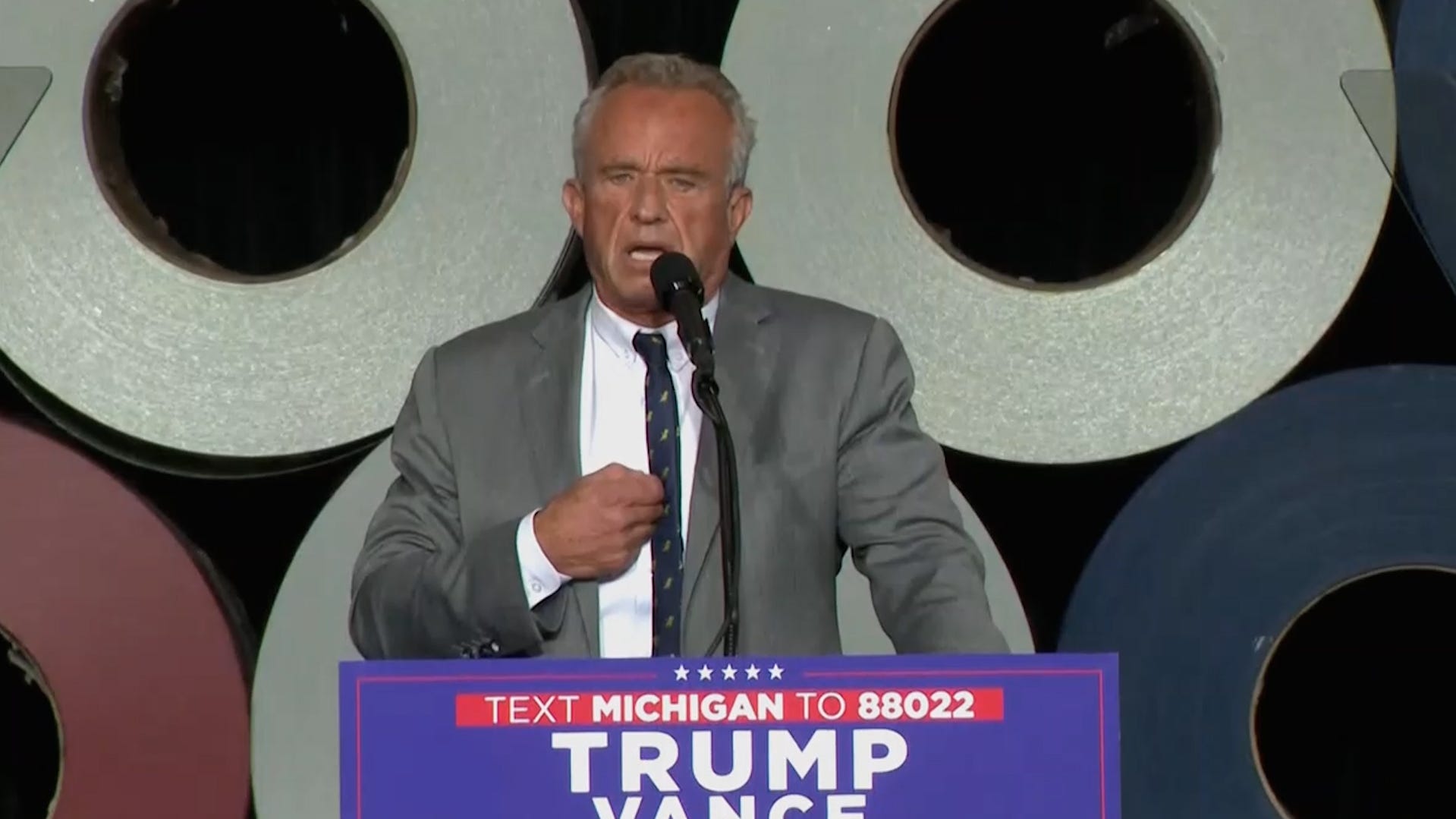Trump's Obamacare Stance: Implications For The Supreme Court And RFK Jr.

Table of Contents
Trump's Historical Opposition to Obamacare
Early Criticisms and Campaign Promises
Trump's consistent criticism of Obamacare dates back to its inception. He frequently attacked the ACA on the campaign trail, framing it as a government overreach that stifled economic growth and limited healthcare choices. His objections centered on several key points:
- Rising Premiums: Trump repeatedly highlighted the rising cost of health insurance premiums under the ACA, arguing that it failed to deliver on its promise of affordable healthcare. He frequently cited anecdotal evidence and media reports to support his claims.
- Limited Choices: Trump criticized the limited choices offered in some ACA marketplaces, arguing that individuals were forced into plans that didn't meet their needs. He promised to expand choices and increase competition within the healthcare market.
- Government Overreach: A core tenet of Trump's opposition was the belief that the ACA represented excessive government intrusion into the private healthcare sector. He advocated for a more market-based approach to healthcare reform.
Examples of his public statements include numerous tweets, rallies, and interviews where he explicitly called for the repeal and replacement of Obamacare. His campaign promises consistently echoed this sentiment, offering a vague alternative that emphasized market forces and individual choice.
Attempts at Repeal and Replacement
During his presidency, Trump and his administration made several attempts to repeal and replace the Affordable Care Act. These efforts ultimately failed, facing significant political and legislative hurdles. Key legislative actions included:
- American Health Care Act (AHCA): This bill, passed by the House of Representatives but ultimately failing to pass the Senate, aimed to repeal and replace key provisions of the ACA. It faced strong opposition from both Democrats and moderate Republicans concerned about its impact on healthcare coverage.
- Executive Orders: The Trump administration also utilized executive orders to weaken certain aspects of the ACA, such as reducing funding for enrollment outreach and advertising. These actions, while not achieving full repeal, aimed to undermine the ACA's effectiveness.
The political challenges faced were significant. Deep divisions within the Republican party, coupled with strong Democratic opposition, proved insurmountable obstacles to comprehensive ACA repeal.
Ongoing Legal Challenges to Obamacare
Supreme Court Cases and Their Impact
The Affordable Care Act has faced numerous legal challenges throughout its existence, with several reaching the Supreme Court during Trump's presidency. These cases often targeted specific provisions of the law:
- NFIB v. Sebelius (2012): While preceding Trump's presidency, this landmark case upheld the ACA's individual mandate as a tax. This ruling was crucial to the law's survival.
- California v. Texas (2021): This case, argued during the Trump administration, sought to invalidate the entire ACA. However, the Supreme Court ruled against the plaintiffs, preserving the ACA's core structure.
The appointment of conservative justices during Trump's presidency significantly influenced the composition of the Supreme Court and, consequently, its approach to cases challenging the ACA. While the court ultimately upheld the ACA's constitutionality in key instances, the ongoing legal threats highlight the fragility of the law.
Potential Future Legal Challenges
Despite several legal victories, the ACA remains vulnerable to future challenges. Areas that might be targeted include:
- The individual mandate: Although upheld as a tax, it could still be challenged under different legal arguments.
- Medicaid expansion: The Supreme Court has allowed states to opt out of Medicaid expansion, and legal challenges could target the legality of this aspect.
- Subsidies and cost-sharing reductions: These provisions are crucial to the ACA's affordability, and challenges could aim to limit access.
A future Republican administration could potentially pursue further legal action against the ACA, increasing the likelihood of additional Supreme Court cases.
RFK Jr.'s Stance and the 2024 Election
RFK Jr.'s Healthcare Platform
Robert F. Kennedy Jr.'s entry into the 2024 presidential race introduces a new dimension to the healthcare debate. His position on healthcare reform differs significantly from both Trump's and the Democratic platform. Key proposals from his plan include:
- Emphasis on preventative care: RFK Jr. advocates for increased investment in preventative care to reduce long-term healthcare costs.
- Addressing pharmaceutical industry influence: He emphasizes reducing the influence of the pharmaceutical industry on healthcare decisions and pricing.
- Expanding access to healthcare: While differing in approach, his platform ultimately aims to expand access to affordable healthcare for all Americans.
His proposals contrast sharply with Trump's focus on market-based reforms and the complete repeal of the ACA.
Implications for the 2024 Election
The contrasting viewpoints of Trump and RFK Jr. on healthcare will likely play a significant role in the 2024 election. Their positions could:
- Influence voter choices: Voters concerned about healthcare access and affordability will likely weigh the candidates' proposals carefully.
- Fracture the Republican party: RFK Jr.'s candidacy presents a challenge to Trump's dominance within the Republican party, particularly on healthcare policy. His platform, while broadly anti-establishment, takes a very different approach to healthcare than Trump.
The outcome of the 2024 election will significantly influence the future trajectory of the ACA and the broader healthcare landscape.
Conclusion
Trump's consistent opposition to Obamacare, the ongoing legal battles surrounding the ACA, and the emergence of RFK Jr.'s distinct healthcare platform have created a complex and dynamic situation with significant implications for American healthcare. Understanding Trump's Obamacare stance and its potential ramifications, particularly in light of the 2024 election and RFK Jr.'s involvement, is crucial for informed civic engagement. Stay informed about future developments regarding Trump's and other candidates' stances on the Affordable Care Act and its future. Continue to research the implications of Trump's Obamacare stance on the healthcare landscape.

Featured Posts
-
 Trump Supporter Ray Epps Defamation Lawsuit Against Fox News Details Of The Jan 6th Case
Apr 22, 2025
Trump Supporter Ray Epps Defamation Lawsuit Against Fox News Details Of The Jan 6th Case
Apr 22, 2025 -
 Building Voice Assistants Made Easy Open Ais Latest Tools
Apr 22, 2025
Building Voice Assistants Made Easy Open Ais Latest Tools
Apr 22, 2025 -
 Bank Of Canadas Rate Pause Expert Analysis From Fp Video
Apr 22, 2025
Bank Of Canadas Rate Pause Expert Analysis From Fp Video
Apr 22, 2025 -
 Is A New Cold War Inevitable Analyzing The Deterioration Of U S China Relations
Apr 22, 2025
Is A New Cold War Inevitable Analyzing The Deterioration Of U S China Relations
Apr 22, 2025 -
 Confirmation Of Pope Francis Death At 88 Years Old
Apr 22, 2025
Confirmation Of Pope Francis Death At 88 Years Old
Apr 22, 2025
Latest Posts
-
 A Look At Elizabeth Stewart And Lilysilks Collaborative Spring Line
May 10, 2025
A Look At Elizabeth Stewart And Lilysilks Collaborative Spring Line
May 10, 2025 -
 New Spring Collection Elizabeth Stewarts Designs For Lilysilk
May 10, 2025
New Spring Collection Elizabeth Stewarts Designs For Lilysilk
May 10, 2025 -
 Go Compare Drops Wynne Evans After Strictly Come Dancing Scandal
May 10, 2025
Go Compare Drops Wynne Evans After Strictly Come Dancing Scandal
May 10, 2025 -
 Celebrity Stylist Elizabeth Stewart Designs Exclusive Capsule Collection For Lilysilk
May 10, 2025
Celebrity Stylist Elizabeth Stewart Designs Exclusive Capsule Collection For Lilysilk
May 10, 2025 -
 Elizabeth Stewart X Lilysilk Spring 2024 Collaboration Unveiled
May 10, 2025
Elizabeth Stewart X Lilysilk Spring 2024 Collaboration Unveiled
May 10, 2025
